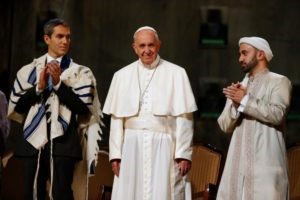– José Maria C.S. André
The International Theological Commission, a body of the Holy See that studies theological questions, published recently a hundred-page book on religious freedom, condensing five years of work. The document was approved by all the members of the Commission and then by the Pope. The original is in French and an Italian translation is already available.
How to digest in a few lines such a complex analysis?
Certain cases offer no doubt. Like the dictators, including those of Catholic convictions, whose prayer (I imagine) might sound like this: “Be praised Lord, for creating the wonderful universe! In fact, to let humans free was not a very good idea, but there is no problem: I will limit their freedom, so they will be able to do only the good.” The Church downright rejects the good intention of fixing God’s work. Another clear situation is the right of society to defend itself against criminals, limiting their freedom if necessary. It is equally clear that one cannot invoke the right to freedom to sell toxic products as if they were healthy, or to trade counterfeit money, because the right of the people not to be deceived weights more than individual raves. These examples are not controversial, but how far should the State interference go? There is a world of nuances that have to be wisely discerned, and –the document (# 80) adds– addressed with prayer.
To begin with (# 4-5), a policy based on purely formal procedures, without ethical and religious inspiration, will not hold, because it does not answer the question: “Why?” Only by recognizing the authority from which justice originates can we state that something “is” just, or “is” unjust. Without this reference to what “is” real, there remains the caprice of whoever has power to command.
Therefore, we discover that God is the source of freedom. Because He created us free and because his respect for us entitles us to be respected by all: “God calls all men, but does not force anyone. That is why freedom becomes a fundamental right that man can claim in his conscience, with responsibility, before the State” (# 27).
The origin of the right to freedom is this: God created me free. With what right does anyone dare to steal from me what God granted me?! Fundamental rights are grounded on the dignity of the person, as God created and respects it (# 31-39). When one loses sight of God’s plan for mankind and its freedom, the very human person is called into question.
To disrespect someone’s freedom is to oppose God, because it is the voice of God that resonates within the conscience. In this sense, forcing someone to act against his/her conscience is to force him/her to go against God. Hence, we have a serious responsibility of purifying our own conscience and we owe an immense respect for the conscience of others (# 40-42). All this is in deep harmony with Christian faith, which, by its very nature, can only be free.
Since the time of the Apostles, the Church has accepted the legitimacy of political authority, because that is what she learned from Jesus himself (# 58). On the other hand, “the kingdom of God is not of this world” (Jn 18:36): “give back to Caesar what is Caesar’s, and to God what is God’s” (Mt 22:21).
God wishes society to organize itself freely, but it does not belong to the State to invent what is just or unjust. The legitimate forms of society do not reject God, nor do they claim to impose an “ethics of the State” as if it had divine powers to conceive ethics (# 62). Quoting Pope Francis: “When, in the name of an ideology, one wants to expel God from society, one ends up by worshiping idols, and soon man ruins himself, his dignity is trampled underfoot, his rights are violated” (Address in 2014, quoted in # 64).
A State that rejects religious references undermines the foundations of human culture (# 45-48). On the other hand, not all religious experiences have the same value (# 70). This is evident because their doctrines contradict themselves and the truth can not be contradictory. However, there is something common in them that is valuable (# 79) and, above all, it is not for any human authority to deprive people of the freedom that the Creator himself granted them, except in cases that seriously go against the common good.
In short, the Christian view of religious freedom is inspired by the truth of faith about God and in the way in which God operates, freely and without forcing anyone (# 76). Dialogue is the right way to announce the Gospel (# 77). If respecting others leads us to martyrdom, this is not weakness, it is fidelity to God (# 82), as St. Peter wrote to the first Christians: proclaim the Gospel, “but in a gentle and respectful way. Keep your conscience clear. Then if people speak against you, they will be ashamed when they see what a good life you live because you belong to Christ” (1 Pet 3, 16, quoted in # 86).


 Follow
Follow


